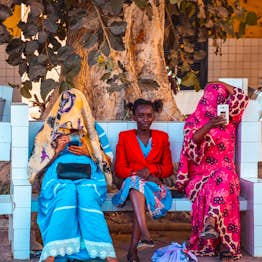Introduction
The year 2021 saw progress in the implementation of the programmes in the fourth Indicative Cooperation Programme (ICP IV 2018-2022) between Luxembourg and Senegal, in which two sectors are priorities: (i) the health sector, and specifically strengthening emergency medical assistance services, combating non-communicable diseases and improving access to universal sickness coverage, and (ii) the vocational training and labour market integration sector for young people, with an emphasis on improving access to and the range of training as well as capacity-building for state actors.
Read more
In the health sector, the year 2021 saw, among other things, the opening of the emergencies skills and care training centre using medical simulation in Dakar, the upgrading of equipment in centres receiving and handling calls, as well as emergency and intensive care services in hospitals, and the provision of mobile emergency and intensive care services through the donation of 18 medical ambulances.
In terms of vocational training, the programme has so far supported 400 young entrepreneurs, 40 of whom have received start-up loans. It has also supported 20 vocational training centres to include their training programmes in departmental economic strategies, as well as short-term training providing qualifications to 1 200 young people.
During Minister Franz Fayot’s first visit to Senegal, in November 2021, he pointed out the importance of Luxembourg’s support in various sectors. This was also underlined by Minister Amadou Hott, Minister Fayot’s Senegalese counterpart, at the 15th partnership committee meeting, which was held during the visit. At the meeting, Minister Fayot announced additional support of EUR 2 million to further strengthen cooperation with the national emergency medical assistance services, and to support two historic partners of Luxembourg’s commitment in Senegal, namely the Abbas Ndao hospital and the Thiès Technical Lycée. The ministers also agreed to extend the fourth Indicative Cooperation Programme for 12 months to address delays in implementation caused by the COVID-19 pandemic.
Multilaterally, the United Nations Population Fund (UNFPA) continued its activities to strengthen the health and social protection system with a view to improving access to high-quality healthcare, despite the health crisis. The International Labour Office (ILO) has continued to implement its programme, designed to equip the vocational and technical training system with appropriate human resources and strengthen the training of trainers in entrepreneurship and methodological monitoring.
Luxembourg continued its support to Senegal for the combat of COVID-19 by providing cold chain equipment to the Institute for Health Research and epidemiological surveillance and training to the Pasteur Institute. This has enabled them to adequately store patient samples, the biological materials needed for screening and sequencing and COVID-19 vaccines, and in the longer term will support their research capacities.
Development of PDA
Reference data
- Population (MIO): 16,74
- GNI (per resident): 3.420
- Human Development Index (HDI): 168/189
- Life expectancy: 68
